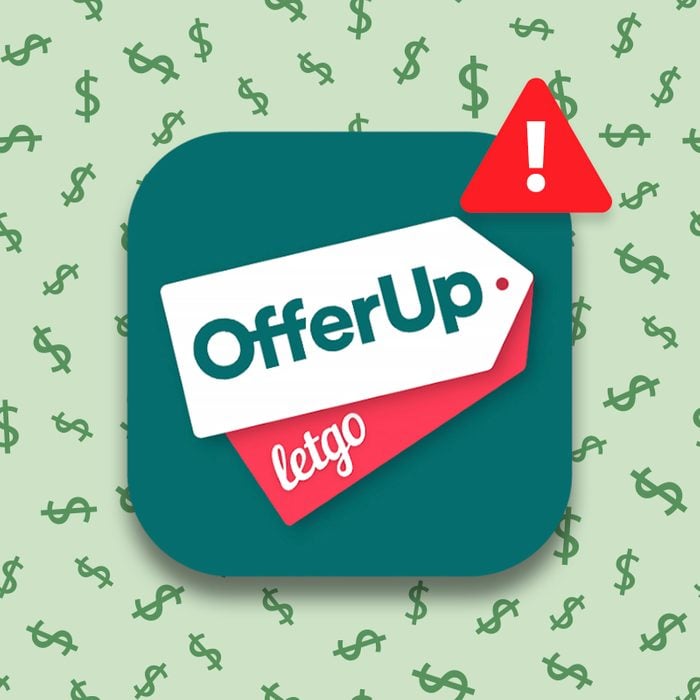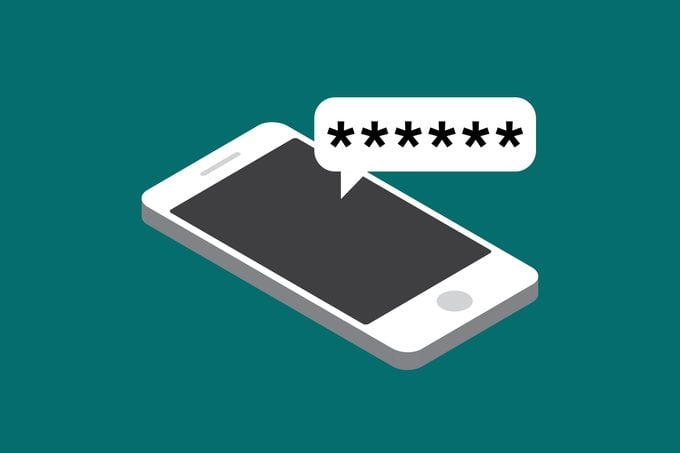10 Common OfferUp Scams to Watch Out For
Updated: Feb. 01, 2024

Scammers are lurking on online marketplaces, but you can protect yourself simply by learning about these OfferUp scams
The garage sale has gone (mostly) digital with online marketplaces. And if you’re looking to buy secondhand items at a discount or make a quick buck by selling your old stuff, you’re probably familiar with OfferUp. One of our favorite platforms, it was created as an alternative to Craigslist in 2011 and quickly gained popularity. But with 44 million annual users and sales expected to reach $23.6 billion by 2025, it’s also a very attractive place for criminals, who have a host of OfferUp scams at their disposal and are looking for their next targets.
“OfferUp’s app is a gateway for scammers, who naturally show an interest in fast-growing easy-cash markets,” says Serpil Hall, head of Financial Crime and Fraud at D4t4 Solutions. “They often pose as trustworthy buyers or sellers of big-price items and prey on people who aren’t computer savvy or aware of current scams. But anyone can become a victim of online scams, so we all need to be cautious when shopping.”
Here’s what you need to know about the most common OfferUp scams—including how to identify them and avoid them—and what to do if you fall for one of them. This information can also help you identify Facebook Marketplace scams, cash app scams and Zelle Scams so that you stay safe and protect your digital wallet, no matter where you’re shopping.
Common OfferUp scams
Fake OfferUp website scam
How this scam works: Fake sites are also referred to as mirror sites. The seller sets up a fake page intended to look like a legitimate OfferUp listing, but instead, it leads you to a phishing link or a form to fill out to complete the purchase. The URL will look very similar to the legitimate one, so this OfferUp scam is incredibly easy to fall for.
How to avoid it: Never click on a link or move to a page outside of OfferUp. If you make a purchase through the OfferUp app, your purchase will be protected, but once you leave the app, you’re on your own. It’s also a good idea to check links on the Google Transparency Report. “This is a terrific free service where you can type in the URL and learn if Google’s research indicates it’s a scam,” says Steven J.J. Weisman, an expert in scams, identity theft and cybersecurity.
Overpayment scam
How this scam works: You might not think that OfferUp scams would involve sending money to the victim, and that’s exactly why this one works—because people aren’t expecting it. This scam has several forms, but here’s one of the most common, according to Karim Hijazi, CEO of Prevailion, a cyber intelligence company: “Sometimes the buyer sends the seller more money than requested, and then they contact the seller and claim to have made a mistake. They’ll ask the seller to return the extra funds or the total payment to them so they can issue a new payment. However, since the original transaction will never actually go through, the seller loses whatever money they send back to the buyer.”
How to avoid it: If you ever receive an overpayment, make sure the payment has finished processing and has been deposited into your account before you issue a refund. Also, stay on the OfferUp app instead of heading over to sites like Zelle or PayPal. Scammers will often try to get you to those sites because the money transfers instantly, and once it’s out of your account, it’s gone and you’re not getting it back.
Multiple posting scam
How this scam works: In this scam, a bad actor—usually an organized scam ring, according to Hall—will post the same listing on a variety of platforms. But the items isn’t real, and you’ll end up clicking on a phishing link that could expose your personal information. These scams are especially popular for vehicle listings.
How to avoid it: The good news is, these OfferUp scams are pretty easy to spot, since they use the exact same photos and descriptions on multiple sites. Do a Google reverse image search to see if the photo pops up elsewhere. Also, take a closer look at the seller; if the account doesn’t have any reviews or ratings, there’s a good chance it’s fraudulent. Plus, adds Hall, “similarities between email addresses, contact details and phone numbers indicate that this is an organized ring creating fictitious accounts.”
Overly interested buyer scam
How this scam works: Scammers often reply to a new ad as soon as you put it up, saying they need to pick up the item right away and suggest arranging the meeting via text to speed things along. “Be skeptical of overly interested or aggressive buyers,” Hijazi warns. “And any time a buyer or seller tries to quickly move the conversation away from the app, stop communicating with them.” Once you leave OfferUp, you’re vulnerable to malicious links, fake forms and bogus verification codes.
How to avoid it: Always use the OfferUp app when messaging potential buyers or sellers. Do not share your phone number or email, and be on alert if someone asks you for this information. “Any personal information you give to a scammer can lead to identity theft,” adds Hall. “The scammers can contact banks to apply for credit cards and hack into your bank account, and they will leave you with no money and savings.”
“Need to sell fast” scam
How this scam works: Scammers will often post ads with the phrases “must sell fast” or “priced to sell,” hoping to entice a quick sale where the buyer won’t ask too many questions. They might offer an item well below market price, or they may claim to have a sold-out item, such as the new PlayStation everyone’s desperate to find.
How to avoid it: “Watch out for too-good-to-be-true offers,” Hijazi says, “particularly on popular or hard-to-find items during busy shopping times of the year, like the holidays or back-to-school season.” If a price doesn’t sound “reasonable” to you, based on the item, it’s probably not a deal—it’s a scam.
Code verification scam

How this scam works: A scammer will pose as a buyer for something you are selling, then ask you for your phone number to text you a verification code, to make sure you’re a real person. But instead of a verification code, their text will contain a malicious link designed to steal your login, password and financial info.
How to avoid it: Never click on a verification link. OfferUp does not use these verification codes, so they are always manufactured by the buyer (or seller) as a tool used to obtain your personal information. If you stick to OfferUp’s app, you should be safe, since the site has a strict verification process. “OfferUp provides a ‘TruYou’ feature, which provides a better level of verification than a traditional sign-up,” Hijazi says. “TruYou requires the registrant to provide a government-issued ID, such as a driver’s license, along with a valid cell phone number, and the person must take a selfie photo while inside the app.”
Bad check scam
How this scam works: You list an item for sale, a seller contacts you and agrees to meet you with a check … but the check turns out to be a fake.
How to avoid it: This one is easy to avoid—never take a personal check from a buyer. Whenever possible, stick to cash transactions for in-person purchases. Also check out these tips on how to spot counterfeit bills.
And an important safety note: If you plan to meet in person, do so in a public place. “Many police departments offer dedicated areas in their parking lots or lobbies for these type of transactions,” says Alex Hamerstone, advisory solutions director at TrustedSec.
Shipping scam
How this scam works: These OfferUp scams can come in various forms, from either the buyer or the seller. Here’s one common incarnation: The buyer will claim the package never arrived and demand a refund. “This is more likely to happen if the person gets you to make arrangements outside of OfferUp,” Hijazi explains. “If you remain within the app, you are less at risk, since OfferUp manages the shipping process.”
In another variation of this scam, the seller may offer to cover the shipping fees and then ask to send you an invoice to cover the cost. They may also suggest using a different shipping service.
How to avoid it: OfferUp calculates shipping costs on the app based on the product’s size, weight and dimensions, so requests for invoices or special shipping services are red flags to avoid for both buyers and sellers. All the experts recommend sticking to the app. “If you leave the app, this makes it impossible for OfferUp to moderate the transaction, and it gives victims no recourse to get their money back,” explains Paul Bischoff, a privacy advocate at Comparitech.
Empty box scam

How this scam works: This scam is exactly what it sounds like. “Scammers list the boxes of expensive items, like game consoles, for sale, tricking people into believing they found a great deal on the item in the box,” Bischoff says, “but it’s just the box.”
How to avoid it: Make sure you see the contents of the box. There’s still no guarantee that the seller won’t scam you by sending you an empty box, but as long as you stay on the OfferUp app, you’ll be protected, especially if there are photos from the listing showing the actual product. If it’s just a photo of the box in the listing, you might be out of luck.
“If someone sells a ton of products yet has zero negative reviews, or if their ratings are inconsistent with what you’d otherwise expect, trust your gut,” says Monica Eaton, COO of Chargebacks911. “A big percentage of OfferUp scams can be traced to fake accounts, fake offers and fake payments.” Make sure you share these tips with loved ones to prevent elder financial abuse.
Counterfeit product scam
How this scam works: You think you’re getting a brand-name item, but when it arrives, it’s actually a knockoff. The Department of Homeland Security warns that counterfeit goods are not only a waste of money—they can also be dangerous. Counterfeit bicycle helmets, for example, might not offer the protection you think they do. And, according to the National Crime Prevention Council, faulty electronics cause more than 70 deaths and 350,000 serious injuries every year. Translation: Those knockoff headphones might not be worth the risk.
How to avoid it: It can be hard to spot counterfeit goods, especially online, so when in doubt, meet the seller in person. And before you buy, be aware of a few red flags: Sellers of counterfeit goods often use stock photos, so that might be your first tipoff. Also take a close look at the packaging, looking for grammatical errors, and if possible, compare the box to the one sold directly from the manufacturer of the product.
How to stay safe on OfferUp
- Don’t click on links from strangers. Scammers create links that look legitimate but actually install malware on your device, compromising your identity or financial information. “You are asking for trouble if you click on links,” says Andy Rogers, a senior assessor at Schellman, a global cybersecurity assessor, adding that if you absolutely can’t control yourself, at least first run the link through a service like VirusTotal, which analyzes URLs and detects malware and other security breaches.
- Research the seller. “Check if the seller has good feedback or complaints against them,” Hall recommends. “Also see if their posted items have blurry images or the information about the item doesn’t seem correct.”
- Stick to the app. Keep all interactions on the app. “Politely decline if the buyer or seller is asking for personal information like your telephone number, bank account details, address and so on,” Hall says. The same goes for payments on Zelle, PayPal or via any other digital wallet, as well as making wire transfers—just say no.
- Use common sense. Just like meeting anyone new for anything, when exchanging goods on OfferUp in person, “do so in a visible, well-protected public place,” Eaton says. “[Don’t] meet at your home, or late at night, or in an unsafe part of town.” If possible, bring a friend with you.
- Test the products. “If you’re buying electronics, bring equipment to test the merchandise before you leave,” Eaton recommends. “For example, if you’re buying an old iPhone, bring a charger and a cord, so you can make sure it still works.”
What should you do if you fall for a scam on OfferUp?
If you think you’ve been a victim of an OfferUp scam or any scam, “don’t try to confront the scammer,” Hall says. “Report any suspicious postings to the app and report to the police.”
OfferUp recommends reporting scams to them first, except in the case of serious issues—like if you’re in immediate danger or you’ve encountered illegal activity. In that case, call the police. Once you’ve contacted law enforcement, follow OfferUp’s steps for reporting serious issues. Then be proactive to protect yourself. Change your passwords, and call your bank and/or credit card company because they may be able to cancel the transaction. You may also want to cancel your cards.
Now that you know how to protect yourself from OfferUp scams, educate yourself on gift card scams, Amazon scams and Venmo scams. Remember: A little knowledge can go a long way.
Get Reader’s Digest’s Read Up newsletter for more tech, humor, cleaning, travel and fun facts all week long.
Sources:
- Serpil Hall, head of Financial Crime and Fraud at D4t4 Solutions
- Steven J.J. Weisman, expert in scams, identity theft and cybersecurity
- Karim Hijazi, CEO of Prevailion
- Alex Hamerstone, advisory solutions director at TrustedSec
- Department of Homeland Security: “Counterfeit Goods: A Danger to Public Safety”
- National Crime Prevention Council: “Go for Real”
- Paul Bischoff, privacy advocate at Comparitech
- Monica Eaton, COO of Chargebacks911
- Andy Rogers, senior assessor at Schellman



